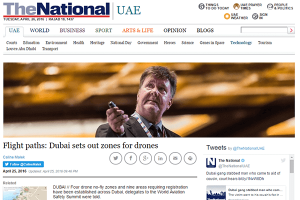DUBAI // Four drone no-fly zones and nine areas requiring registration have been established across Dubai, delegates to the World Aviation Safety Summit were told.
The emirate’s civil aviation authority said on Monday that the International Airport, Al Minhad Air Base, the Palm Jumeirah around Skydive Dubai and Al Maktoum Airport were designated no-fly zones, while flying unmanned aerial vehicles (UAV) in nine other areas, including Downtown Dubai around the Burj Khalifa and the Skydive Dubai desert campus, will require permission.
“Some no-fly zones are very dangerous areas to try to attempt to operate,” said Michael Rudolph, head of aviation regulations and safety at the authority.
“We need to look at the environment, too, where there are sensitive areas. We try to find synergies between operators but we also need to keep the airspace of Dubai safe.”
A law that required the registration of drones went into force last April, three months after recreational drones strayed into flight paths at Dubai airport and led to the grounding of passenger planes.
A month earlier, a drone incursion resulted in the shutdown of the emirate’s airspace for 55 minutes, costing its economy Dh3.7 million per minute.
“We can’t afford to have that again, which is why we started with the process of registration,” Mr Rudolph said.
Registration cards will cost from Dh50 for hobbyists to Dh500 for commercial operators.
The authority also revealed surveillance technology on Monday.
The remotely piloted aircraft system (RPAS), demonstrated for the first time to an audience of aviation regulators, operators, manufacturers and pilots at the summit was created to detect drones hovering in any area considered sensitive.
“This technique was developed in Dubai and is unprecedented internationally,” said Khalid Al Arif, director of standards and regulations at Dubai Civil Aviation Authority.
“For example, if you determine an area of a defined surface of a half hectare, we can visualise the drone with high accuracy, its path, elevation and location.”
He said technology would increase confidence in airports, airlines, and in federal authorities.
“We can see this live and the video footage can even be sent to the police,” he added. “Regardless of the threat, we are always on alert and we are watching what is going on worldwide in terms of security.”
Five categories of drone operators – government, hobbyists, professionals, commercial and temporary users– will have to register with the authority or face penalties.
The authority is in the process of finalising those in agreement with the police.
The authority has performed 15 trials of RPAS so far and it hoped that 500 drones will be registered by the end of the year.
Mr Rudolph said: “We’re looking at controlling commercial and high-profile professional drone operators. We need to look at a more delicate way to deal with the hobbyists and those involved in clubs like drone racing because we’re getting more requests for videography and surveys in what we call sensitive areas in proximity to the airport and could have an effect on commercial operations.”
Ruben Morales, general manager of corporate safety and security at Hong Kong Airlines, said the initiative gave airlines a new level of confidence.
“If we come to Dubai, Europe and North America, where we see standards are being enforced and in place, it makes operators’ work easier because we dedicate less resources to take over part of the work.”
cmalek@thenational.ae



